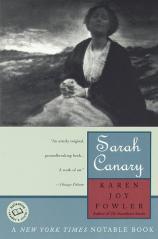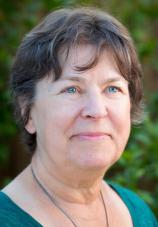Reading Group Guide
Discussion Questions
Sarah Canary

1. Who is Sarah Canary?
2. One of the themes of Sarah Canary is how perception shapes reality. Henry James once said "one cannot truly escape one's background--where one comes from has everything to do with one's point of view." Hence, Chin, Adelaide, B.J., and Harold have vastly different views when it comes to the identity of Sarah Canary. Given this, why do you think Karen Joy Fowler leaves the question of Sarah Canary's identity a mystery?
3. How important is Sarah Canary's identity?
4. Why do you think Fowler has intertwined her narrative with short chapters of actual events from the nineteenth century?
5. Why do you think Fowler begins many chapters with quotes from Emily Dickinson?
6. Sarah Canary is set in the Washington Territory in the 1870s, just after the American Civil War. From a historical and geographic standpoint, what is the significance of this setting for Sarah Canary?
7. Chin talks about the one-winged bird and Burke talks about nature loving symmetry. Is it also human nature to condemn something that is different or irregular? Why?
8. What does Tom mean when he says, "The earth talks to us, but we don't speak its language. Why should it not mean something just because you don't understand?"
9. What is the author's attitude toward Charles Darwin, Sigmund Freud, and science in general?
10. The last chapter of the book reports recent news events--Jim Bakker's fall from grace, the massacre in Tiananmen Square, President Reagan's politically incorrect speech about the plight of the American Indian, The Wall Street Journal and The New York Times reporting evidence of a Chinese wild man, headlines in the Weekly World News of a wounded Civil War soldier being found alive, and a report in the Worldwide Gazette of a "Flea Circus Horror." Why do you think the author ends the book this way?
11. What is the significance of Burke's little mermaid?
12. The main characters in Sarah Canary--a Chinese railway worker, a suffragist, an escaped mental patient, and a huckster--are all considered outcasts of the age. Who are their modern equivalents and how do their experiences differ from those of people who have been marginalized in the past?
13. One critic remarked that "Fowler has an uncompromising and informed political vision." How would you describe the author's political position and how does it shape the story?
14. Consider the following excerpt: "Sanity is a delicate concept, lunacy only slightly less so. Over the last few centuries, more and more of those phenomena once believed to belong to God have been assigned to the authority of the psychoanalyst instead. Some of the saints can be diagnosed in retrospect as epileptics. St. Theresa was almost certainly an hysteric. St. Ida of Lorraine seems to have suffered from perceptional insanity. She only thought her body was amplified to monstrous proportions in her desire to be acceptable to God....The prognosis for such cases in our own age is excellent; saintliness can often be completely cured."
15. In the end, what do each of the characters gain as a result of their journey in pursuit of Sarah Canary? Are the characters better off for their experience?
16. Why is the story of Sarah Canary narrated by someone of the late twentieth century?
17. One critic remarked that the characters in Sarah Canary are "larger than life." Are the characters in the book realistic? Which character did you relate to most? Whose perception of Sarah Canary is closest to your own?
18. One reviewer wrote, "The author's message...is that at its core, America hasn't changed one whit since those rugged, lawless pioneer days [that serve as the setting for Sarah Canary]." Do you agree?
19. Karen Joy Fowler is a cocreator of the James Tiptree Jr. Memorial Award, which is presented, in her words, "to a short story or novel that explores or expands our understanding of gender...to remind the field of its own importance in the continual struggle to re-imagine more livable sexual roles for ourselves." Does Sarah Canary accomplish this goal? If so, how?
Sarah Canary
- Publication Date: February 10, 1998
- Paperback: 320 pages
- Publisher: Ballantine Books
- ISBN-10: 0345416449
- ISBN-13: 9780345416445







